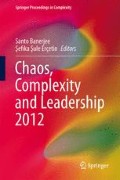Abstract
Through this paper, we are trying to answer to question of “are we coming to the end of globalization- does chaos knock the door? Analyzing will revisit book of Norman Angell “The Great Illusion” that’s why first we will give what Norman Angell claimed in his book and comments on it, then we are going to give three challenges which, are global financial crisis, unequal growth and climate change and natural resources, of our age which threaten future of world- or clearly trigger possibility of conflict and of course in future.
Access this chapter
Tax calculation will be finalised at checkout
Purchases are for personal use only
References
Angell N (1910) The great illusion. Putnam, New York/London
Arrighi G (1999) The global market. J World Syst Res V(2):217–251
Bakrania S, Lucas B (2009) The impact of the financial crisis on conflict and state fragility in Sub-Saharan Africa, Governance and Social Development Resource Centre. University of Birmingham, Birmingham
Bello W (2002) The crisis of globalist project & the New Economics of George W. Bush. In: McPlanet conference, Berlin, 27 June 2002
Dupont A (2008) The strategic implications of climate change. Survival 50(3):29–54
Ferguson N (2005) Sinking globalization. Foreign Aff 84(2):64–77
For Richer For Poorer (2012) The economist. 13 October
Krugman P (2008) The great illusion. The New York Times
National Intelligence Council (2012) Global trends 2030: alternative worlds. National Intelligence Council, Washington, DC
Nye JS (2009) Which globalization will survive, Office of Director of National Intelligence. Daily Star
Victor DG, Kennel C, Ramanathan V (2012) The climate threat we can beat. Foreign Aff 91(3):112–121
Warner J (2012) We mustn’t fall for The Great Illusion again. The Daily Telegraph
Yıldızoğlu E (2009) Globalization as a crisis form. In: Alfredo S-F, Yalman GL (eds) Economic transitions to neoliberalism in middle income countries: policy dilemmas, economic crises, forms of resistance. Routledge, London, pp 39–47
Author information
Authors and Affiliations
Corresponding author
Editor information
Editors and Affiliations
Rights and permissions
Copyright information
© 2014 Springer Science+Business Media Dordrecht
About this paper
Cite this paper
Açıkalın, Ş.N., Erçetin, Ş.Ş. (2014). Great Illusion in Twenty-First Century-Chaos Knocking Door. In: Banerjee, S., Erçetin, Ş. (eds) Chaos, Complexity and Leadership 2012. Springer Proceedings in Complexity. Springer, Dordrecht. https://doi.org/10.1007/978-94-007-7362-2_1
Download citation
DOI: https://doi.org/10.1007/978-94-007-7362-2_1
Published:
Publisher Name: Springer, Dordrecht
Print ISBN: 978-94-007-7361-5
Online ISBN: 978-94-007-7362-2
eBook Packages: Physics and AstronomyPhysics and Astronomy (R0)

